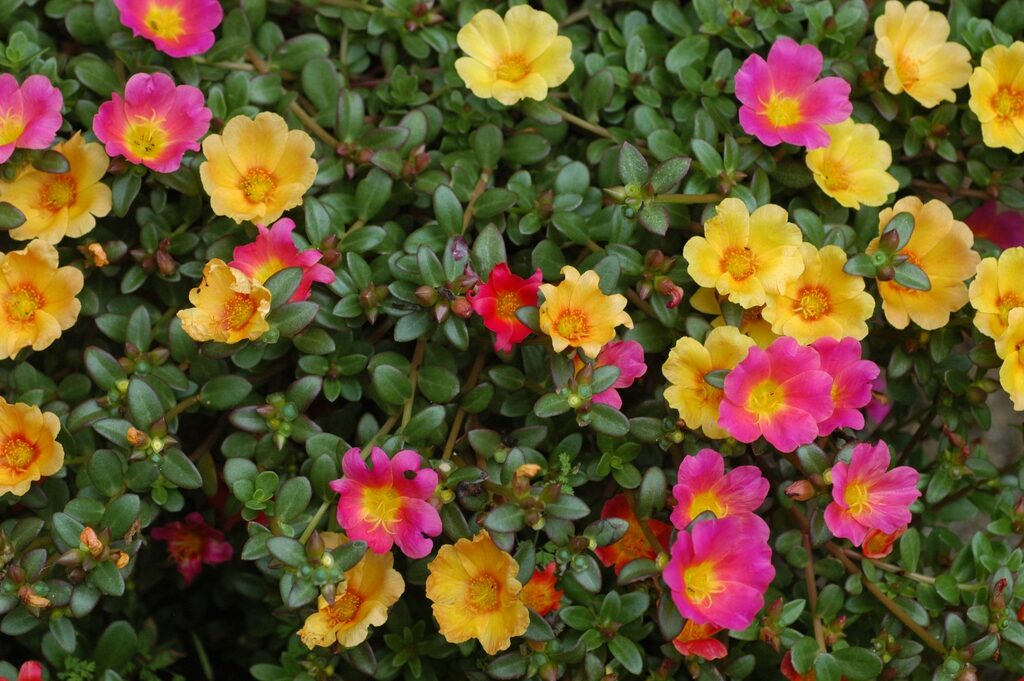Plant Spotlight: Moss Rose
go.ncsu.edu/readext?946943
en Español / em Português
El inglés es el idioma de control de esta página. En la medida en que haya algún conflicto entre la traducción al inglés y la traducción, el inglés prevalece.
Al hacer clic en el enlace de traducción se activa un servicio de traducción gratuito para convertir la página al español. Al igual que con cualquier traducción por Internet, la conversión no es sensible al contexto y puede que no traduzca el texto en su significado original. NC State Extension no garantiza la exactitud del texto traducido. Por favor, tenga en cuenta que algunas aplicaciones y/o servicios pueden no funcionar como se espera cuando se traducen.
Português
Inglês é o idioma de controle desta página. Na medida que haja algum conflito entre o texto original em Inglês e a tradução, o Inglês prevalece.
Ao clicar no link de tradução, um serviço gratuito de tradução será ativado para converter a página para o Português. Como em qualquer tradução pela internet, a conversão não é sensivel ao contexto e pode não ocorrer a tradução para o significado orginal. O serviço de Extensão da Carolina do Norte (NC State Extension) não garante a exatidão do texto traduzido. Por favor, observe que algumas funções ou serviços podem não funcionar como esperado após a tradução.
English
English is the controlling language of this page. To the extent there is any conflict between the English text and the translation, English controls.
Clicking on the translation link activates a free translation service to convert the page to Spanish. As with any Internet translation, the conversion is not context-sensitive and may not translate the text to its original meaning. NC State Extension does not guarantee the accuracy of the translated text. Please note that some applications and/or services may not function as expected when translated.
Collapse ▲Having you been looking for a flowering annual that requires little care during these hot summer months? Then the moss rose (Portulaca) might be a plant to consider. Moss rose or also called purslane is a low growing, summer annual that will provide flower color all summer with very little care.
Moss rose is native to the hot, dry regions of Brazil, Argentina and Uruguay. It is very drought tolerant and can handle dry soils, making it a good candidate for our summer months. It can even perform well in soils with low fertility. Moss rose does need full sun and well-drained soils to flower well throughout the summer.

Moss rose (Portulaca) is a low growing, summer annual that will provide flower color all summer with very little care.
Moss rose is a succulent with fleshy, needle-like leaves and red stems that can store water during dry periods. There is a wide range of flower colors including: orange, rose, red, pink, yellow and white. The flowers have a cactus-like appearance and may be single or double petals.
The moss rose is a low growing plant only getting about 6 inches tall and will spread to a width of 10 to 12 inches wide creating a low, dense mat. When planting in a landscape bed, you will want to place them towards the front so they can be seen and space 6 inches apart so they have room to spread.
There are many great uses for moss rose in the landscape. It makes a great summer border plant in landscape beds. You can use it on the edges of containers to let it spread over the container’s edge. It is also often planted in rock gardens intermingled among the rocks.
Moss rose has very little care or problems to worry about. It can have occasional deer damage if in an area easily accessible to deer. You can have problems with the plant not flowering well if it is planted in a shady area. The only care would be to remove faded flowers (deadhead) to prevent the plant from going to seed. These plants do have the tendency to self-sow and come up from seed next year. However, the second generation is typically not as attractive as the first.
To add a splash of color to your landscape or containers but don’t want to worry much about care, consider the moss rose for a bright, colorful summer plant.
Jessica Strickland is an agriculture extension agent, specializing in horticulture for North Carolina Cooperative Extension in Wayne County.
Learn More!
- Gardening questions? Ask an Extension Master Gardener℠ Volunteer. The Extension Master Gardener℠ Volunteers of Wayne County Plant Clinic is open on Mondays and Wednesdays from 10 a.m. to 1 p.m. (April through August) to help you with your gardening questions. Contact by phone at 919-731-1433,email at master.gardener@waynegov.com or stopping by the N.C. Cooperative Extension, Wayne County Center at The Maxwell Regional Agricultural & Convention Center (3114B Wayne Memorial Drive, Goldsboro).
- Sign up for N.C. Cooperative Extension – Wayne County Gardening email list to receive timely gardening tips.
- Learn more by following us on Facebook and Instagram




